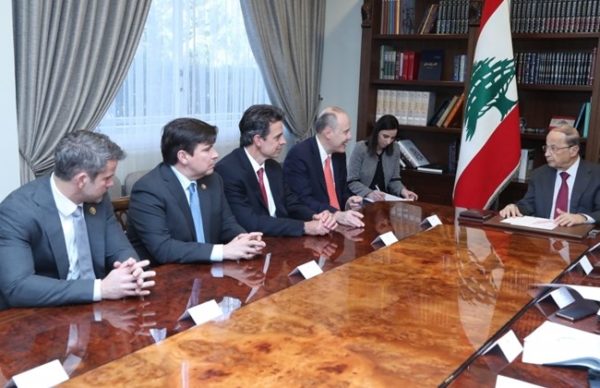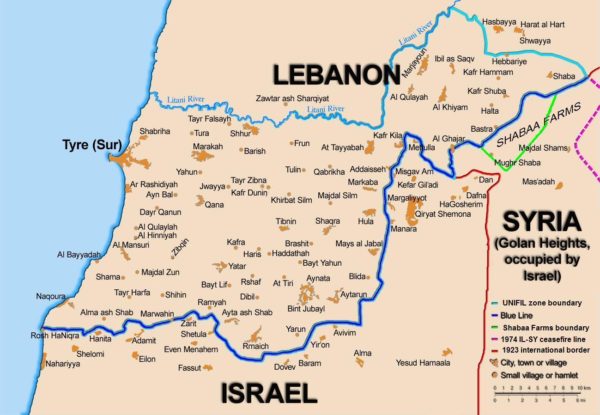
Certain things become clear when you fly over the “Blue Line” — which separates Lebanon from Israel — in an open helicopter.
As the first members of Congress to visit this contentious stretch of land in over a decade, we realized that even though we come from different political parties, we have much more in common than we might have thought. Between the three of us, we share a strong support for a safe and secure Israel, a desire to counter ISIS and Hezbollah, and an understanding that Lebanon needs international help to manage the next phase of the Syrian conflict and the more than 1 million refugees currently living in the country.
We know now that these intentions are not incompatible, and we’ve developed recommendations to ensure the United States can act more effectively in the region.
Without question, the U.S. is Lebanon’s primary security partner, providing $1.7 billion in aid since 2006. Over that time, we’ve wisely invested in the Lebanese Armed Forces, or LAF, a stabilizing and moderating force in the country.
This support is important because we know that a weak Lebanese military would leave the country even more vulnerable to unwanted Iranian influence. The situation is already on shaky ground as the presence of Hezbollah, the Islamic republic’s local political party and terrorist proxy, brings a constant fear of violence to the nearly 9 million people living on the other side of the Blue Line.
Over the past decade, with assistance from the U.S. and the international community, the LAF has made notable progress in size, strength, and capability. It now operates with 75,000 troops and has plans to grow its naval operations with four additional speedboats expected to join its fleet this year.
In a meeting with Gen. Joseph Aoun, the commander of the Lebanese Armed Forces, we learned that LAF soldiers used to each shoot a measly 10 rounds per year, but now with better training and equipment from the U.S., they shoot 5,000 rounds per year.
A stronger relationship
In fact, many Lebanese soldiers do their training at military bases in our home states and across the U.S. This partnership shows the appreciation the LAF has for our military capability, and bodes well for a stronger working relationship and better collaboration in future operations.
During our visit to the border, we also learned that the U.S. isn’t Lebanon’s only partner. The United Nations and its peacekeeping force, the U.N. Interim Force in Lebanon, or UNIFIL, also play a vital and stabilizing role for the country.
Some 10,000 U.N. peacekeepers from 43 countries work side by side with the Lebanese army and navy. Joint exercises with LAF personnel constitute a core element of UNIFIL’s mandate. In just one year, from July 2017 to June 2018, almost 700 joint activities were conducted on land and sea.
Over the past 10 years, this joint force development has paid off. In August 2017, for example, the Lebanese army launched a huge operation to drive the last ISIS stronghold from the country. During the “Dawn of the Hills” campaign, LAF commanders effectively used a combination of special forces, round-the-clock surveillance, drones and armored vehicles, and close air support. The success of the mission proved this is a viable, long-term option for Lebanon’s security, separate from Hezbollah.
Behind the scenes, UNIFIL acts as a key broker between the Israeli and Lebanese defense forces. In the absence of a mutually accepted or even visible border, the U.N. is delineating a Blue Line of markers and barrels to help avoid inadvertent crossings by residents and to help reduce tensions between the two countries.
The U.N. also moderates an ongoing discussion between the two forces, providing military leaders with a means to discuss infractions, find solutions and maintain the calm. Since the 2006 war between Israel and Hezbollah, which began in southern Lebanon, the U.N. has played an important role in helping keep the peace across the area.
In this current environment, with relative quiet on the border and a dramatically improved Lebanese military, we need to capitalize on our footprint here. We certainly acknowledge the LAF is not without fault nor does it operate entirely free of Hezbollah’s influence. Notably, the LAF is currently unwilling to rid southern Lebanon of Hezbollah missiles, an area of grave concern we expressed to Gen. Aoun during our meeting.
Still, we do see the potential for the LAF to continue growing as a Hezbollah counterweight, especially as the U.S. ramps up its efforts to disrupt the finances of these terrorist groups.
Moving forward, the U.S. can bolster bilateral support for the LAF, enticing even more of its personnel to train at U.S. military bases, while also ensuring greater focus on weeding out the influence of Hezbollah. While the LAF works to strengthen its defenses, we should push for the full funding of the U.N. peacekeeping mission in Lebanon.
We can also ensure the U.S. maintains its support for the U.N. refugee agency, or UNHCR, and other humanitarian organizations helping Lebanon deal with the ongoing Syrian refugee crisis, which has put a massive strain on the limited resources of this small country and others in the region.
With a population of approximately 4 million citizens and 1 million Syrians, Lebanon is the largest per capita refugee hosting nation in the world. Despite this, the country has shown remarkable generosity since the Syrian war began in 2011, but the government and populace are showing signs of fatigue.
Fighting terrorism
With continued U.N. humanitarian and development assistance, we can help the Lebanese government both politically and economically, while also reducing opportunities for ISIS or Hezbollah to incite dissent in disaffected communities. Plus, this aid — administered by UNHCR and UNICEF —provides vital schooling to over 200,000 Syrian children, as well as vocational and job training programs that help prepare refugees who want to return home and restart their lives.
Looking out over the Blue Line, we saw a complicated situation but a great opportunity for continued progress and real potential for eliminating Hezbollah.
While more steps need to be taken, the goals outlined above could be accomplished by our government this year and would make a valuable difference in a conflict that has caused immeasurable harm and suffering. We firmly believe that with hope and opportunity, and greater stability in the region, freedom will prevail and a lasting peace can be achieved.
Reps. Adam Kinzinger, an Illinois Republican, and Vicente Gonzalez, a Texas Democrat, serve on the House Foreign Affairs Committee. Rep. Tom Graves, a Georgia Republican, serves on the House Appropriations Committee. They recently traveled to Lebanon to assess the impact of U.S. aid.
Roll Call

Leave a Reply
You must be logged in to post a comment.